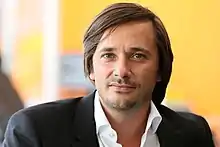Grégoire Courtine
Grégoire Courtine (born January 9, 1975 in Dijon, France) is a French neuroscientist and a professor at the École Polytechnique Fédérale de Lausanne (EPFL), where he is the Director of the Defitech center for interventional neurotherapies (.NeuroRestore).[1][2][3] His research focuses on the field of neurotechnology, with the aim to restore locomotor functions in patients with central nervous system disorders such as spinal cord injuries.[4]
Grégoire Courtine | |
|---|---|
 Grégoire Courtine in 2014 | |
| Born | January 9, 1975 |
| Nationality | France |
| Known for | Restoration of locomotor functions in paralyzed animals |
| Academic background | |
| Alma mater | University of Pavia University of Burgundy |
| Academic work | |
| Institutions | École Polytechnique Fédérale de Lausanne (EPFL) |
| Main interests | Neurorehabilitation |
| Website | https://www.epfl.ch/labs/courtine-lab/ |
Career
After being training in physics and mathematics, Courtine obtained a PhD in experimental medicine jointly from the University of Pavia and the INSERM at the University of Burgundy in 2003. He then performed post-doctoral work in the laboratory of Reggie Edgerton at UCLA from 2004 to 2007, where he studied the neural basis of spontaneous recovery after spinal cord injuries, and developed novel strategies to restore functional neural networks after spinal cord resection in rats.[5][6] In 2008, he was appointed associate professor at the University of Zurich, where he established his own group with the aim to restore voluntary control of locomotion in paraplegic rats. He moved to EPFL in 2012 as an associate professor, and was promoted to full professor in 2019.[7][8]
In 2014, Courtine founded the biotechnology venture 'Onward' with the aim to develop novel neurostimulation therapies.[9]
Research
Courtine heads the G-LAB within the Brain Mind Institute and the Center for Neuroprosthetics at EPFL. Research in the G-LAB aims at restoring motor functions after central nervous system disorders such as spinal cord injuries.[4]
Using targeted spinal cord stimulation neurotechnologies, Courtine and colleages significantly contributed to the field of neurorehabilitation by publishing a number of studies successively reporting the restoration of voluntary locomotion in rats with partial[10][11][12] and complete[13] spinal cord injuries, in primates [14][15] and in paralyzed human patients.[16]
Distinctions
Courtine has received several international research and innovation prizes such as the Chancellor's Award for postdoctoral research (2008),[17] the International Foundation for Research in Paraplegia Schellenberg Research prize (2010),[18] the Debiopharm Group Life Science Award (2013)[19] and the Rolex Award (2019).[20]
He was also awarded a starting grant (2010), a consolidator grant (2015) and two proof-of-concept grants (2013 & 2019) from the European Research Council.[21] In 2020, he was awarded the IET A F Harvey Prize.[22]
References
- ORCID. "gregoire courtine (0000-0002-5744-4142)". orcid.org. Retrieved 2020-10-06.
- "Loop | G Courtine". loop.frontiersin.org. Retrieved 2020-10-06.
- Center, Wyss. "Gregoire Courtine, PhD". Wyss Center. Retrieved 2021-01-21.
- "G-LAB UPCOURTINE". www.epfl.ch. Retrieved 2020-10-06.
- Courtine, Gregoire; Song, Bingbing; Roy, Roland R.; Zhong, Hui; Herrmann, Julia E.; Ao, Yan; Qi, Jingwei; Edgerton, V. Reggie; Sofroniew, Michael V. (January 2008). "Recovery of supraspinal control of stepping via indirect propriospinal relay connections after spinal cord injury". Nature Medicine. 14 (1): 69–74. doi:10.1038/nm1682. ISSN 1546-170X. PMC 2916740. PMID 18157143.
- Courtine, Grégoire; Gerasimenko, Yury; van den Brand, Rubia; Yew, Aileen; Musienko, Pavel; Zhong, Hui; Song, Bingbing; Ao, Yan; Ichiyama, Ronaldo M.; Lavrov, Igor; Roy, Roland R. (October 2009). "Transformation of nonfunctional spinal circuits into functional states after the loss of brain input". Nature Neuroscience. 12 (10): 1333–1342. doi:10.1038/nn.2401. ISSN 1546-1726. PMC 2828944. PMID 19767747.
- Herbelin, Bruno (2019-07-17). "Prof. Grégoire Courtine promoted Full Professor". Cite journal requires
|journal=(help) - "Grégoire Courtine at EPFL". Retrieved 6 October 2020.
- "ONWARD - Empowering Movement". www.onwd.com. Retrieved 2021-01-21.
- Brand, Rubia van den; Heutschi, Janine; Barraud, Quentin; DiGiovanna, Jack; Bartholdi, Kay; Huerlimann, Michèle; Friedli, Lucia; Vollenweider, Isabel; Moraud, Eduardo Martin; Duis, Simone; Dominici, Nadia (2012-06-01). "Restoring Voluntary Control of Locomotion after Paralyzing Spinal Cord Injury". Science. 336 (6085): 1182–1185. Bibcode:2012Sci...336.1182V. doi:10.1126/science.1217416. hdl:11382/373455. ISSN 0036-8075. PMID 22654062. S2CID 14665852.
- Carey, Benedict (2012-05-31). "In Rat Experiment, New Hope for Spine Injuries (Published 2012)". The New York Times. ISSN 0362-4331. Retrieved 2020-10-07.
- "Running repairs". The Economist. ISSN 0013-0613. Retrieved 2020-10-07.
- Wenger, Nikolaus; Moraud, Eduardo Martin; Raspopovic, Stanisa; Bonizzato, Marco; DiGiovanna, Jack; Musienko, Pavel; Morari, Manfred; Micera, Silvestro; Courtine, Grégoire (2014-09-24). "Closed-loop neuromodulation of spinal sensorimotor circuits controls refined locomotion after complete spinal cord injury". Science Translational Medicine. 6 (255): 255ra133. doi:10.1126/scitranslmed.3008325. ISSN 1946-6234. PMID 25253676. S2CID 33473196.
- Capogrosso, Marco; Milekovic, Tomislav; Borton, David; Wagner, Fabien; Moraud, Eduardo Martin; Mignardot, Jean-Baptiste; Buse, Nicolas; Gandar, Jerome; Barraud, Quentin; Xing, David; Rey, Elodie (November 2016). "A brain–spine interface alleviating gait deficits after spinal cord injury in primates". Nature. 539 (7628): 284–288. Bibcode:2016Natur.539..284C. doi:10.1038/nature20118. ISSN 1476-4687. PMC 5108412. PMID 27830790.
- editor, Ian Sample Science (2016-11-09). "Brain implant allows partially paralysed monkeys to walk again". The Guardian. ISSN 0261-3077. Retrieved 2020-10-07.CS1 maint: extra text: authors list (link)
- Wagner, Fabien B.; Mignardot, Jean-Baptiste; Le Goff-Mignardot, Camille G.; Demesmaeker, Robin; Komi, Salif; Capogrosso, Marco; Rowald, Andreas; Seáñez, Ismael; Caban, Miroslav; Pirondini, Elvira; Vat, Molywan (November 2018). "Targeted neurotechnology restores walking in humans with spinal cord injury". Nature. 563 (7729): 65–71. Bibcode:2018Natur.563...65W. doi:10.1038/s41586-018-0649-2. ISSN 1476-4687. PMID 30382197. S2CID 53148162.
- "Chancellor's Award for Postdoctoral Research – Award Recipients". UCLA Postdoctoral Scholars. 2019-08-12. Retrieved 2020-10-07.
- "IRP Schellenberg Research Prize" (PDF). Retrieved 7 October 2020.
- "Debiopharm Group™ presents the 'Debiopharm Group Life Sciences Award 2013' and two 'Junior Debiopharm Group Life Sciences Awards 2013' during the annual EPFL SV- Life Science Symposium". Debiopharm. Retrieved 2020-10-07.
- "Help paralysed people walk again - Rolex Awards". rolex.org. Retrieved 2020-10-07.
- "ERC FUNDED PROJECTS". ERC: European Research Council. Retrieved 2020-10-07.
- "The AF Harvey lecture - The IET". www.theiet.org. Retrieved 2020-12-10.